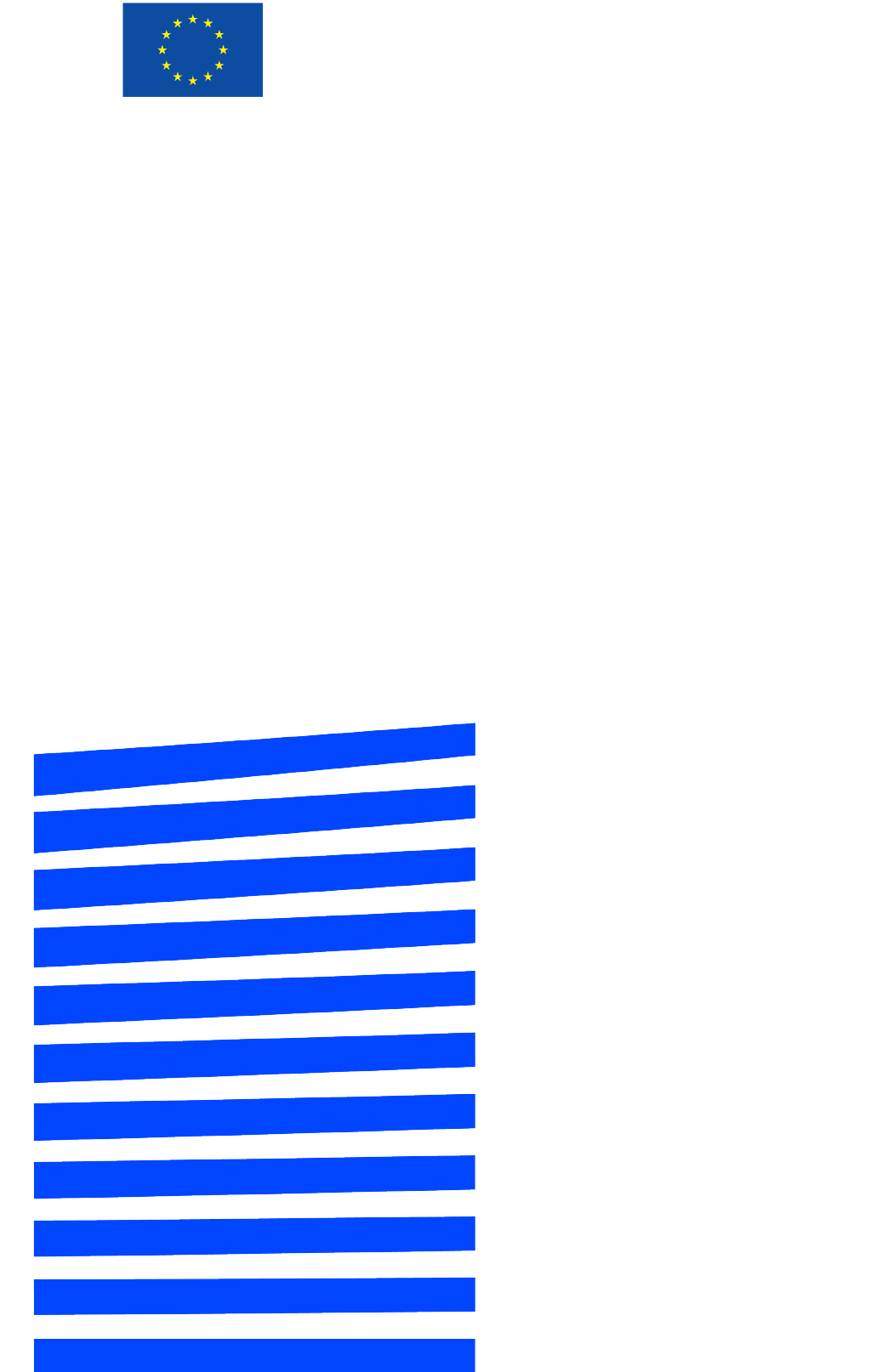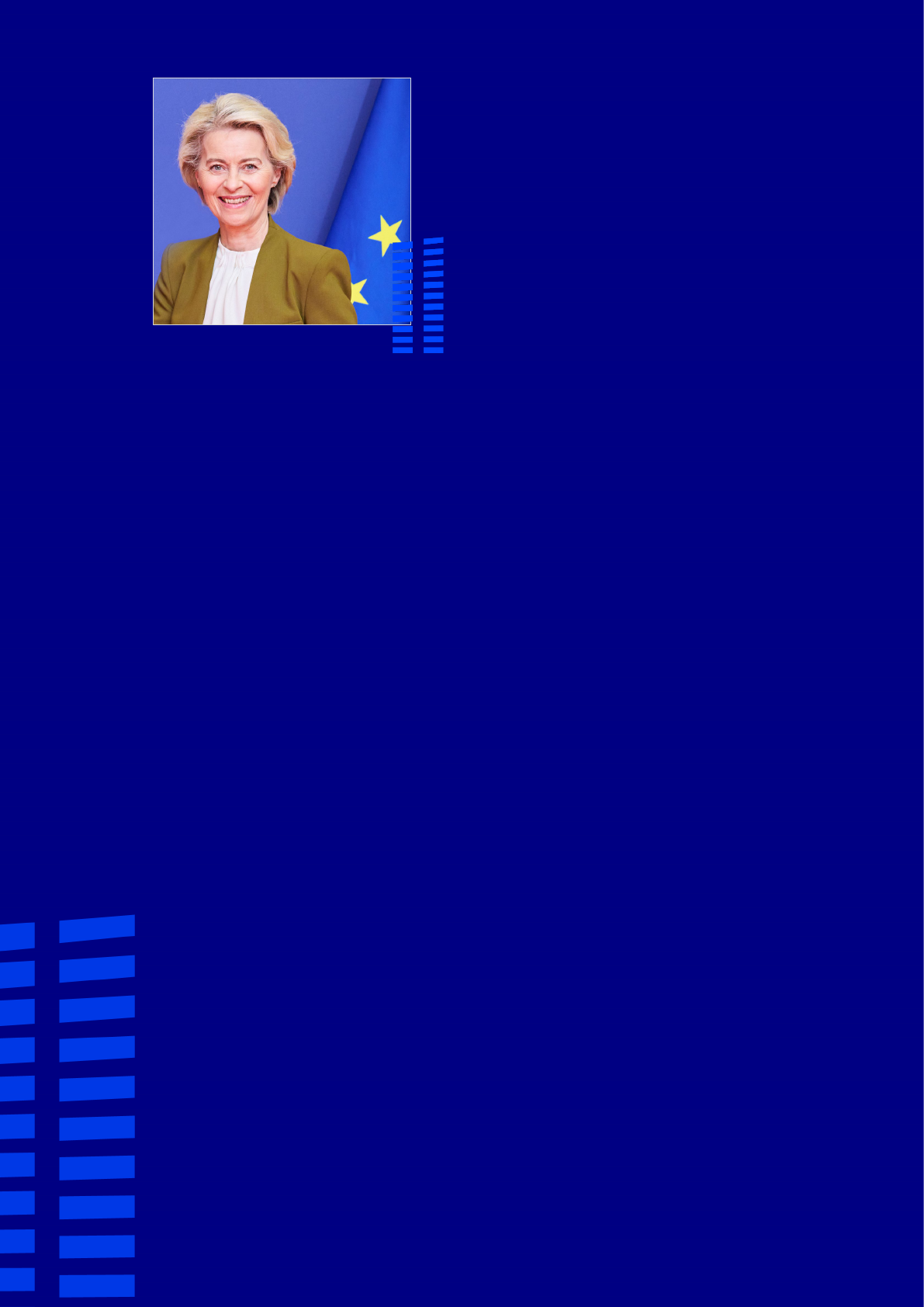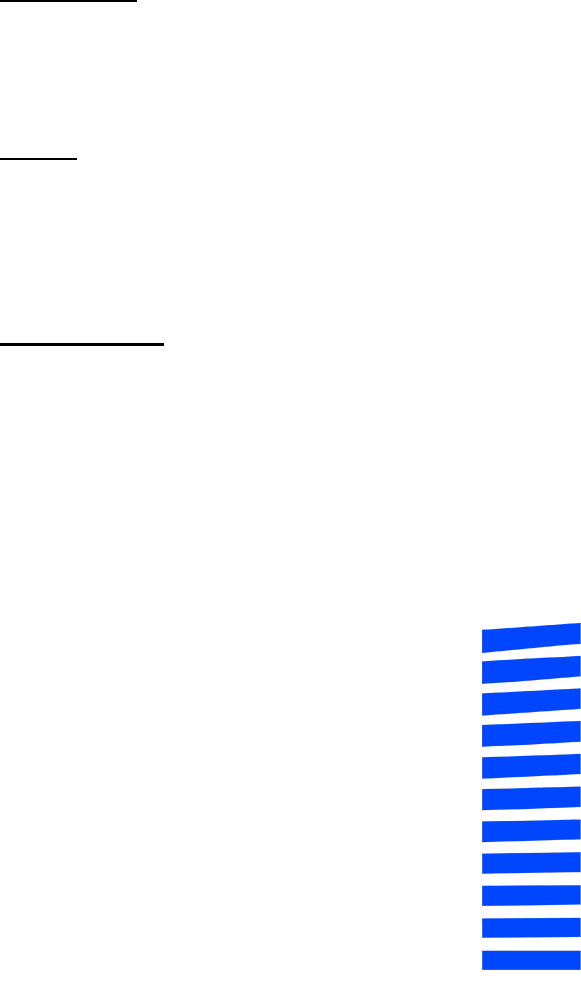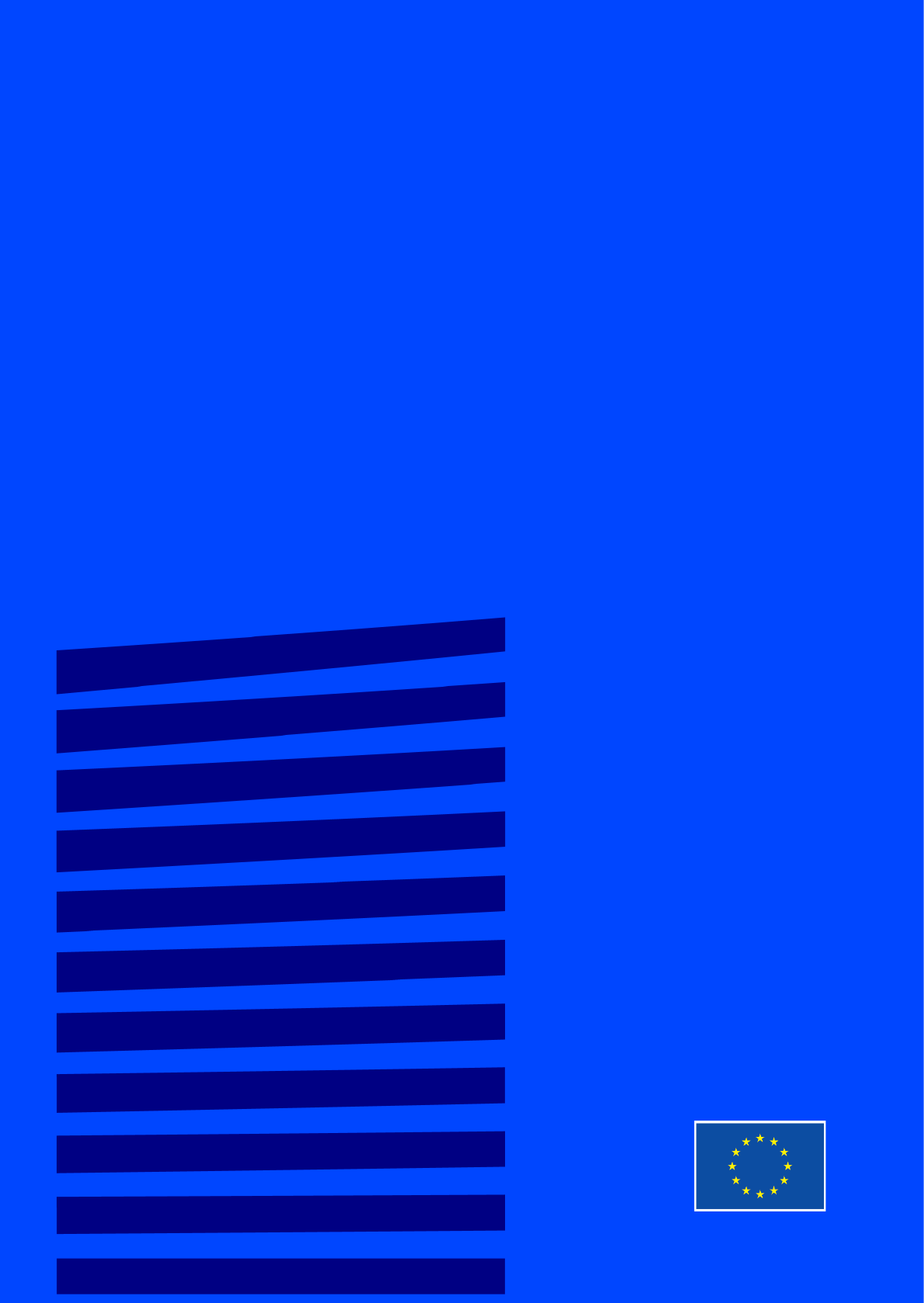
EUROPE’S CHOICE
POLITICAL GUIDELINES
FOR THE NEXT EUROPEAN COMMISSION
2024−2029
Ursula von der Leyen
Candidate for the European Commission President
Strasbourg
18 July 2024

Strasbourg
18 July 2024
EUROPE’S CHOICE
POLITICAL GUIDELINES
FOR THE NEXT EUROPEAN COMMISSION
2024
−2029
Ursula von der Leyen
Candidate for the European Commission President

3
EUROPE’S CHOICE
Campaigning across Europe ahead of this year’s European elections was a reminder
of what makes our Union what it is. Almost 500 million people with such disparate
cultures, complex histories and differing perspectives all coming together at the same
time to articulate their wish for an entire Union of 27 countries. In casting their vote
they also help to build a shared European identity – all of this bound together by our
rich and varied cultural tapestry. This is Europe’s greatest strength. It makes Europe
more than a construct or a project. Europe is our home: unique in design and
united in diversity.
From the record number of first-time voters to those who have voted in every
European election, people expressed hopes and aspirations for a healthier and more
prosperous future. But they also pointed to the fact that we are in an era of anxiety
and uncertainty. Europeans have real doubts and concerns about the instabilities and
insecurities we face – from the cost of living, housing and doing business to the way
issues such as migration are handled. From our security at home to the wars in
Ukraine and the Middle East. They also worry that Europe is often not fast enough;
that it can be either too distant or too burdensome.
All of these expectations and concerns are real, legitimate and must be responded to.
For that reason, I believe it is essential that the democratic centre in Europe
holds. But if that centre is to hold it must live up to the scale of the concerns and the
challenges that people face in their lives. Failure to do so would fuel resentment and
polarisation and leave a fertile ground for those who peddle simplistic solutions but
in reality want to destabilise our societies.
This is the backdrop to what is an era of profound change – for our society and our
security, our planet and our economy. The speed of change can be destabilising and,
for some, can lead to a sense of loss for the world as it used to be and a worry for the
world as it will be.

4
All of this – coupled with the fallout from elections and events in a more contested
world – has created a turbulent and potentially seismic period for Europe. The risks
are real, the responsibilities serious.
Europe now faces a clear choice.
A choice to either face up to the uncertain world around us alone. Or to unite our
societies and unite around our values.
A choice to be dependent, to let the divisions weaken us. Or to be bold in our
ambition and sovereign in our action, working with our partners around the world.
A choice to ignore new realities or the speed of change. Or to be clear-eyed about the
world and threats around us as they really are.
A choice to let the extremists and appeasers prevail. Or to ensure our democratic
forces stay strong.
My view is that our era’s greatest challenges – from security to climate change to
competitiveness - can only be solved through joint action. Our threats are too
great to tackle individually. Our opportunities too big to grasp alone.
Against this backdrop, I believe Europe must choose its best option: Union.
This is based on a deep conviction that it is only Europe that can live up to our
generational challenges in this unstable world – whether supporting Ukraine for as
long as it takes, protecting our planet, ensuring social fairness, defending
democracy, supporting livelihoods, industries and farmers, or leading on the tech
breakthroughs that will shape the world for the rest of this century.
In the last five years, Europe has shown what it can achieve when it does it
together. When it is fast and uses its size and power – as we did when securing
vaccines for every Member State at the same time. When it is bold and ambitious –
as we were with on the twin green and digital transitions and our recovery plan,
NextGenerationEU. When it is united – as we have been in support of Ukraine,
freedom and democracy at the darkest and most difficult of times.
It is time for Europe to step up collectively once again.
This is a shared responsibility for all European voters, but also for all those flying the
European flag, from Kyiv to Chisinau, Tbilisi and across the Western Balkans – as
well as those calling for a European future in the streets of towns and cities across
our Union and continent. We must prepare for that future – by supporting all
candidates in their merits-based journey to our Union, and by preparing our Union
for the future with essential reforms.

5
The Union that we choose cannot be boiled down to a binary question of more or less
Europe. For these times, we need a Union that is faster and simpler, more focused
and more united, more supportive of people and companies. We need a Union
that acts where it has added value and where we all mobilise together with a clear
goal and a collective mission – EU institutions, national and regional governments,
private sector, social partners, citizens and civil society.
We have achieved a lot together in the last five years, from the European Green Deal
to NextGenerationEU, the Pact on Migration and Asylum and the implementation of
the European Pillar of Social Rights. We must and will stay the course on all of
our goals, including those set out in the European Green Deal.
Our focus must now be on implementing what we have agreed, working closely with
all stakeholders and focusing on our big challenges. This is why I want to define a set
of focused and collective objectives for 2030 and beyond, with clear targets and
outcomes in these priority areas.
Defence and security. Sustainable prosperity and competitiveness. Democracy and
social fairness. Leading in the world and delivering in Europe.
The Political Guidelines are our plan for European strength and unity. The
priorities set out here draw on my consultations and on the common ideas discussed
with the democratic forces in the European Parliament, and also on the European
Council’s Strategic Agenda for 2024-2029. They are not an exhaustive work
programme but aim to steer our common work.
The next five years will define Europe’s place in the world for the next five decades.
It will decide whether we shape our own future or let it be shaped by events or by
others.
In a world of adversity and uncertainty, I believe Europe must choose to stick
together and dare to think and act big. To live up to the legacy of our past, to deliver
for the present, and to prepare a stronger Union for the future.
This is the driving force behind these guidelines and all that I want to work on with
the European Parliament and the Member States in the next five years.

Political Guidelines | Ursula von der Leyen – Candidate for the European Commission President
6
A new plan for Europe’s sustainable
prosperity and competitiveness
Europe has always been a continent of
industry, enterprise and innovation –
reinventing itself through industrial and tech
revolutions, global competition and changing
societies.
This strength is in large part down to our
unique social market economy, which gives
Europe many advantages over competitors.
But there are still too many structural brakes
on our competitiveness. Our companies
operate in a turbulent world, with more
unfair competition, higher energy prices,
skills and labour shortages and difficulties in
accessing the capital they need.
We have seen first-hand the dangers of
dependencies or fraying supply chains – from
medical products in the pandemic to Putin’s
energy blackmail or China’s monopoly on
raw materials essential for batteries or chips.
The world is in a race that will dictate who
will be the first to climate neutrality and first
to develop the technologies that will shape
the global economy for decades to come.
Europe cannot afford to fall behind and lose
its competitive edge in this race, nor can it
leave any strategic vulnerabilities exposed.
We have a lot to build on – from the massive
investment in clean and digital tech in
NextGenerationEU to the approach on
sovereignty agreed on by Leaders in
Versailles.
We have a lot of assets that give us a
competitive edge, from world-class
researchers and universities, to thriving small
businesses and a stable environment based on
the rule of law and a level playing field.
But given the scale of the challenges and
opportunities, we now need to go much faster
and further to ensure competitiveness,
prosperity and fairness. I will also draw on
the upcoming report by Mario Draghi on
competitiveness for this work.
We need a new European Prosperity
Plan to:
Make business easier and deepen
our Single Market;
Build a Clean Industrial Deal to
decarbonise and bring down
energy prices;
Put research and innovation at the
heart of our economy;
Boost productivity with digital
tech diffusion;
Invest massively in our
sustainable competitiveness;
Tackle the skills and labour gap.
Making business easier
Europe’s Single Market is key to our
competitiveness. It allows goods, services,
money and people to move freely, opening
up markets and making life easier for people,
companies and investors.
But it could do so much more. We need a
new momentum to complete the Single
Market in sectors like services, energy,
defence, finance, electronic communications
and digital. This will allow our companies –
especially our small and medium-sized
enterprises (SMEs) – to scale up and make
the most of the market.

Political Guidelines | Ursula von der Leyen – Candidate for the European Commission President
7
I believe we need a new approach to
competition policy, better geared to our
common goals and more supportive of
companies scaling up in global markets -
while always ensuring a level playing field.
This should be reflected in the way we assess
mergers so that innovation and resilience are
fully taken into account.
We will ensure competition policy keeps
pace with evolving global markets and
prevents market concentration from raising
prices or lowering the quality of goods or
services for consumers.
The 24 million European SMEs create
quality jobs anchored in local communities.
But they, along with larger companies, still
face too many complexities.
We need to make business easier and
faster in Europe.
I will make speed, coherence and
simplification key political priorities in
everything we do.
Each Commissioner will be tasked with
focusing on reducing administrative burdens
and simplifying implementation: less red tape
and reporting, more trust, better enforcement,
faster permitting.
They will hold regular dialogues on
implementation with stakeholders to discuss
how best to align implementation with
realities on the ground.
They will work with a Vice-President for
Implementation, Simplification and
Interinstitutional Relations to stress-test the
entire EU acquis.
On this basis, we will make proposals to
simplify, consolidate and codify legislation
to eliminate any overlaps and contradictions
while maintaining high standards.
We will also address the patchwork of
national regulations that makes doing
business in different EU countries more
complicated. We will make it easier for
innovators to succeed by reducing the costs
of failure.
To support this, I will propose a new EU-
wide legal status to help innovative
companies grow. This will take the form of
a so-called 28
th
regime to allow companies to
benefit from a simpler, harmonised set of
rules in certain areas.
We also need to better support firms whose
size and financing capacity cannot be
compared to large corporations. They are
often the target of killer acquisitions from
foreign companies seeking to eliminate them
as a possible source of future competition.
We will introduce a new category of small
midcaps and assess where existing
regulation applying to large companies is too
burdensome, disproportionate or a hindrance
to their competitive development.
Future legislation must also be simplified and
designed with small businesses in mind and
in a spirit of subsidiarity. This will notably be
done though a new SME and
competitiveness check to help avoid
unnecessary administrative burdens,
maintaining high standards.
But better lawmaking has to be a joint task –
with all institutions involved and all of the
legislative process covered – from proposal
to amendments to adoption.
In this spirit I will propose to renew
Interinstitutional agreement on
simplification and better law making so
that each institution assesses the impact and
cost of its amendments in the same way.
To ensure that we collectively follow up on
enforcement and implementation, I will
also ask each Commissioner to prepare an
annual progress report for their respective
European Parliament Committee and Council
formation.

Political Guidelines | Ursula von der Leyen – Candidate for the European Commission President
8
A Clean Industrial Deal
We have made historic progress in setting out
our climate ambitions and have shown that
we can successfully reduce our emissions
while growing our economy.
We must and will stay the course on the
goals set out in the European Green Deal.
The climate crisis is accelerating at pace.
And there is an equally urgent need to
decarbonise and industrialise our economy at
the same time.
We must focus on implementing the
existing legal framework for 2030 – in the
simplest, fairest and most cost-efficient way.
We need a new Clean Industrial Deal for
competitive industries and quality jobs in the
first 100 days of the mandate.
Our full focus will be on supporting and
creating the right conditions for
companies to reach our common goals. This
means simplifying, investing and ensuring
access to cheap, sustainable and secure
energy supplies and raw materials.
This will prepare the way towards the 90%
emission-reduction target for 2040 which
we will propose to enshrine in our European
Climate Law. At every step, we will work in
partnership with industry, social partners and
all stakeholders.
We will put forward an Industrial
Decarbonisation Accelerator Act to support
industries and companies through the
transition.
This will channel investment in infrastructure
and industry, in particular for energy
intensive sectors. It will support European
lead markets for the development, production
and diffusion in industry of clean tech. It will
also help to speed up related planning,
tendering and permitting processes.
We must bring down energy bills for
companies and households.
Thanks to European measures, renewables
have reached a record high, accounting for
50% of EU electricity power generation over
the last year. Dependence on Russian fossil
gas has been substantially reduced and
energy savings have brought down overall
consumption.
However, we still face many challenges. Our
energy market must work better to bring
prices down and ensure consumers benefit
from the lower production costs of clean
energy.
We will continue to bring down energy
prices by moving further away from fossil
fuels, reinforcing joint procurement for fuels,
and developing the governance needed for a
true Energy Union.
We will scale-up and prioritise investment in
clean energy infrastructure and technologies.
This will include renewables and low-carbon
technologies, grid infrastructure, storage
capacity and transport infrastructure for
captured CO2. We will also invest in energy-
efficiency measures, the digitalisation of our
energy system and the deployment of a
hydrogen network.
Beyond this, we must use the power and size
of our market to secure supplies. This is why
I will propose to activate and extend our
aggregate demand mechanism to go
beyond gas and include hydrogen and critical
raw materials.
We will work on new Clean Trade and
Investment Partnerships to help secure
supply of raw materials, clean energy and
clean tech from across the world.
By leading by example at home, I want
Europe to remain a leader in international
climate negotiations, building on recent EU
initiatives on global issues such as methane,
carbon pricing and global targets for
renewables and energy efficiency.
We will set out our global climate and
energy vision ahead of COP30 in Brazil in

Political Guidelines | Ursula von der Leyen – Candidate for the European Commission President
9
2025. We will also step up our green
diplomacy and engage more with non-EU
countries on external aspects of our policies.
To achieve our climate objectives, we also
need to make it easier for people to shift to
more sustainable options. This is notably the
case with mobility. Cross-border train travel
is still too difficult for many citizens. People
should be able to use open booking systems
to purchase trans-European journeys with
several providers, without losing their right
to reimbursement or compensatory travel.
To this end we will propose a Single Digital
Booking and Ticketing Regulation, to
ensure that Europeans can buy one single
ticket on one single platform and get
passengers’ rights for their whole trip.
Reaching climate neutrality by 2050 will
require a wide range of innovative
technologies, in areas from mobility to
energy. For instance, the 2035 climate
neutrality target for cars creates predictability
for investors and manufacturers. Getting
there will require a technology-neutral
approach, in which e-fuels have a role to play
through a targeted amendment of the
regulation as part of the foreseen review.
A more circular and resilient
economy
Working to decarbonise our economy will be
part of our continued shift to a more
sustainable pattern of production and
consumption, retaining the value of resources
in our economy for longer.
This will be the purpose of a new Circular
Economy Act, helping to create market
demand for secondary materials and a single
market for waste, notably in relation to
critical raw materials.
We will put forward a new chemicals
industry package, aiming to simplify
REACH and provide clarity on “forever
chemicals”, or PFAS.
We must make our economy more resilient
and less dependent.
This is notably important in the health and
pharmaceutical sector. The EU has been
confronted with severe shortages of medical
devices and medicines, with antibiotics,
insulin, painkillers and other products
becoming particularly difficult to obtain.
To remedy this, we will propose a Critical
Medicines Act to reduce dependencies
relating to critical medicines and ingredients,
particularly for products where there are only
a few supplying manufacturers or countries.
This will be part of our work to complete the
European Health Union with diversified
supply chains, access to the most advanced
treatments, more resilient health systems and
strategic inventories of key medicines. We
must continue our work on anti-microbial
resistance.
We will also step up our work on preventive
health, in particular for mental health,
including at work, and cardiovascular
diseases, as well as on treatments for
degenerative illnesses and research on
autism. This will build on the successful
model of the Beating Cancer Plan.
We must also do more to protect the security
of our health systems, which are increasingly
the target of cyber and ransomware attacks.
To improve threat detection, preparedness
and crisis response, I will propose a
European action plan on the cybersecurity
of hospitals and healthcare providers in
the first 100 days of the mandate.
Boosting productivity with
digital tech diffusion
Europe’s competitiveness is hamstrung by its
lower productivity compared to its direct
global competitors. Central to this is the
insufficient diffusion of digital technologies,
impacting our ability to use tech to develop
new services and business models.

Political Guidelines | Ursula von der Leyen – Candidate for the European Commission President
10
We will start by focusing on the
implementation and enforcement of the
digital laws adopted during the last mandate.
Tech giants must assume responsibility for
their enormous systemic power in our society
and economy. We have begun the active
enforcement of the Digital Services Act and
the Digital Markets Act. We will ramp up
and intensify our enforcement in the
coming mandate.
We will support this by tackling challenges
with e-commerce platforms to ensure
consumers and businesses benefit from a
level playing field based on effective
customs, tax and safety controls and
sustainability standards.
Reaching our digital targets and building a
true digital single market would be a
gamechanger for our productivity and
competitiveness.
We will step up our investment in the next
wave of frontier technologies, in particular
supercomputing, semiconductors, the Internet
of Things, genomics, quantum computing,
space tech and beyond.
Through our Artificial Intelligence (AI),
Europe is already leading the way on making
AI safer and more trustworthy, and on
tackling the risks stemming from its misuse.
We must now focus our efforts on becoming
a global leader in AI innovation.
In the first 100 days, we will ensure access to
new, tailored supercomputing capacity for AI
start-ups and industry through an AI
Factories initiative.
We will also develop with Member States,
industry and civil society an Apply AI
Strategy to boost new industrial uses of AI
and to improve the delivery of a variety of
public services, such as healthcare.
In this spirit, I will propose to set up a
European AI Research Council where we
can pool all of our resources, similar to the
approach taken with CERN.
To support the development of AI and other
frontier technologies, Europe needs to
exploit the untapped potential of data.
Access to data is not only a major driver for
competitiveness, accounting for almost 4%
of EU GDP, but also essential for
productivity and societal innovations, from
personalised medicine to energy savings.
However, too many companies in Europe
struggle to get access to the data they need –
while large foreign tech companies use
European data to fuel their business.
While ensuring high standards of data
protection, we will support companies by
improving open access to data, notably to
support SMEs to fulfil reporting obligations.
Europe needs a data revolution.
This is why we will put forward a European
Data Union Strategy. This will draw on
existing data rules to ensure a simplified,
clear and coherent legal framework for
businesses and administrations to share data
seamlessly and at scale, while respecting
high privacy and security standards.
Putting research and innovation
at the heart of our economy
Europe’s competitiveness – and its position
in the race to a clean and digital economy –
will depend on starting a new age of
invention and ingenuity. This requires
putting research and innovation, science and
technology, at the centre of our economy.
We will increase our research spending to
focus more on strategic priorities, on
groundbreaking fundamental research and
disruptive innovation, and on scientific
excellence.
To do this, we will expand the European
Research Council and the European
Innovation Council.

Political Guidelines | Ursula von der Leyen – Candidate for the European Commission President
11
Europe must also be at the cutting edge
between emerging science, tech and industry,
the nexus that will make this tech revolution
faster and more transformative.
I want Europe to make the most of the
biotech revolution. Biotechnologies,
supported by AI and digital tools, can help
modernise entire parts of our economy, from
farming and forestry, to energy and health.
In order to make it easier to bring biotech
from the laboratory to factory and then onto
the market we will propose a new European
Biotech Act in 2025.
This will be part of a broader Strategy for
European Life Sciences to look at how we
can support our green and digital transitions
and develop high-value technologies.
To lead on innovation, we need to create the
conditions for researchers to thrive. This
means providing the infrastructure and
innovative laboratories they need to test and
develop ideas through new public-private
partnerships, such as joint undertakings.
It also means attracting new talents and
retaining the best and brightest minds here in
Europe. To do this, I want to strengthen the
collaboration between research departments,
higher education and business – notably by
strengthening our University Alliances.
Turbo charging investment
This will be an investment Commission.
We must unlock the financing needed for the
green, digital and social transition. We will
maximise public investment and leverage and
de-risk private capital – working closely with
the European Investment Bank.
This investment cannot be financed through
the public purse alone. Completing the
Capital Markets Union could attract an extra
EUR 470 billion of investment per year.
We need to be more ambitious in tackling the
lack of private capital and our still too
shallow markets.
Innovative European companies and start-ups
should not be forced to look at the United
States, Asia or other markets to finance their
expansion. They should be able find what
they need to grow here in Europe too.
This is why we will put forward risk-
absorbing measures to make it easier for
commercial banks, investors and venture
capital to finance fast-growing companies.
To unlock capital and ensure a level playing
field, we will review our regulatory
framework to address barriers that restrict the
amount of European capital available to
finance innovation.
We will tackle the fragmentation of our
financial markets which sees EUR 300
billion of European families’ savings
transferred to foreign markets every year.
To do this, we will develop the proposal in
the Enrico Letta report and propose a
European Savings and Investments Union,
including banking and capital markets. This
will help leverage the enormous wealth of
private savings in Europe to invest in
innovation and the clean and digital
transitions.
Beyond private savings in Europe, our
current financial instruments in the capital
market are important to attract savings from
around the world as the EU name is a very
safe asset with attractive yields.
We must also make better use of public
procurement – which accounts for 14% of
EU GDP.
A 1% efficiency gain in public procurement
could save EUR 20 billion a year. And it is
one of the main levers available to develop
innovative goods and services and create lead
markets in clean and strategic technologies.
I will propose a revision of the Public
Procurement Directive. This will enable
preference to be given to European products
in public procurement for certain strategic

Political Guidelines | Ursula von der Leyen – Candidate for the European Commission President
12
sectors. It will help ensure EU added value
for our citizens, along with security of supply
for vital technologies, products and services.
It will also modernise and simplify our public
procurement rules, in particular with EU
start-ups and innovators in mind.
When it comes to public financing and
investment, the first priority will be ensuring
the use of the resources available via
NextGenerationEU and the current budget
Looking ahead, the Clean Industrial Deal
must enable us to invest more together in
clean and strategic technologies and in
energy intensive industries. The future of the
clean and cutting-edge tech industry must be
made in Europe.
This is why I will put forward a new
European Competitiveness Fund as part of
our proposal for a new and reinforced budget
in the next multiannual financial framework.
This investment capacity will invest in
strategic technologies – from AI to space,
clean tech to biotech - to ensure that we
develop strategic technologies and
manufacture them here in Europe. And it will
ensure that we use the power of our budget to
leverage and de-risk private investment in
our common goals.
The European Competitiveness Fund will
support Important Projects of Common
Interest (IPCEIs) so that Europe can use its
collective strength to invest together in
ambitious common projects – as has already
been done on a smaller scale with batteries,
hydrogen and microelectronics.
I will make IPCEIs simpler and faster to
get financed and off the ground. The first
new set of common projects will be proposed
in early 2025.
Tackling the skills and labour
gaps
Europe needs a radical step change in
ambition and action – for all skill levels and
for all types of training and education. This is
as important for people’s careers and
prospects as it is for our competitiveness.
To do so, we will establish a Union of Skills
– focusing on investment, adult and lifelong
learning, skill retention and the recognition
of different types of training to enable people
to work across our Union.
Central to this will be embedding lifelong
learning into education and careers and
supporting the training and the career
prospects of teachers.
We will focus on improving basic skills and
propose a STEM Education Strategic Plan.
This will aim to address the worrying decline
in performance and the lack of qualified
teachers in areas linked to science,
technology, engineering and maths. It should
also bring more girls and women into STEM
education and careers.
It is also important to give vocational
education and training (VET) the prominence
it deserves. It prepares people for work and
gives them the skills that companies are
looking for. This is why I will propose a
European Strategy for Vocational
Education and Training, notably to boost
the number of people with a secondary VET
degree.
In a fast-moving economy we need to be
more responsive to the needs of our
companies. We will boost and refocus skills
funding in the EU budget to ensure it is
better linked to labour markets and more
focused on sectors crucial for the twin
transitions.
We need to make sure that we benefit from
all high-quality skills irrespective of where
and how they were acquired. This is why we
will continue to work towards a European
Degree and will put forward a Skills
Portability Initiative to ensure a skill
acquired in one country is recognised in
another.

Political Guidelines | Ursula von der Leyen – Candidate for the European Commission President
13
A new era for European Defence and
Security
‘World peace cannot be safeguarded without
the making of creative efforts proportionate
to the dangers which threaten it.’
The first line of the Schuman Declaration
encapsulates the story of Europe. It speaks to
our past – riven by war, division and some of
the worst conflicts the world has ever seen.
Peace in Europe has never been a given but
any illusions were shattered by Putin’s war of
aggression in Ukraine.
The sickening and remorseless attacks on
children’s hospitals, energy infrastructure
and other civilian targets show the lengths
that Putin’s Russia will go to.
Ukraine is fighting for Europe’s freedom,
democracy and values. Our collective resolve
must be as strong as the challenge is great.
The best investment in European security
is investing in the security of Ukraine.
Europe’s financial, political and military
support must be sustained for as long as it
takes.
We will use all the instruments at our
disposal, including through the European
Peace Facility, working on everything from
immediate needs to future reconstruction
efforts through the Ukraine Facility.
If the last few years have been a sharp
reminder about how fragile peace is, they
have also been a wake up call for Europe to
give itself the means to defend and protect
itself and to deter potential adversaries. This
is all the more acute as we look towards a
more fractured and uncertain world in which
Europe can take nothing for granted.
We will look at all of our policies through a
security lens. We will plan for scenarios that
we hope will never come to pass, but we
cannot take the risk of being underprepared
or over reliant.
Bringing the European Defence
Union to life
The last several years have exposed the
chronic under investment and a lack of
efficient spending in our military capabilities.
To put this into perspective, combined EU
spending on defence from 1999 to 2021
increased by 20%. In that time, Russia’s
defence spending increased by almost 300%
and China's by almost 600%. At the same
time, our spending is too disjointed, disparate
and not European enough. We must change
this.
Our work in the next five years will be
focused on building a true European
Defence Union.
Member States will always retain
responsibility for their own troops, from
doctrine to deployment, but there is a lot
Europe can do to support and coordinate
efforts to strengthen the defence industrial
base, innovation and the Single Market.
To help coordinate this work at the European
level, I will appoint a Commissioner for
Defence, who will work closely with the next
High Representative /Vice-President in
accordance with the Treaty.
To frame the new approach and to identify
our investment needs we will jointly present
a White Paper on the Future of European
Defence in the first 100 days of the mandate.

Political Guidelines | Ursula von der Leyen – Candidate for the European Commission President
14
Central to this work will be strengthening the
EU-NATO partnership. We will continue to
extend our cooperation with NATO to cover
all threats, including new dangers linked to
cyber, hybrid or space, and to strengthen our
transatlantic partnership.
In an era of rearmament, the first priority is
to significantly increase investment.
While there has been progress, defence
budgets are still predominantly spent on a
national basis. A fraction of equipment
spending in Europe is devoted to EU joint
procurement. And the vast majority of
defence acquisitions by Member States are
still made from outside Europe.
We need to spend more, spend better,
spend together.
The first task is the urgent need to rebuild,
replenish and transform national armed
forces – as defined by Member States.
We will build up the European Defence
Fund, investing in high-end defence
capabilities in critical areas such as naval,
ground, air combat, space-based early
warning and cyber.
The second task is to invest more in our
defence industry. We will reinforce the
European Defence Industry Programme to
incentivise common procurement to address
the EU's most critical capability gaps.
We will create a true Single Market for
Defence products and services, enhancing
production capacity and fostering joint
procurement.
The third task is to pool our resources and
counter our common threats through flagship
European Defence Union projects. These
should focus on our biggest common and
cross-border threats.
Working with Member States and in close
coordination with NATO, we will propose a
number of Defence Projects of Common
European Interest starting with a European
Air Shield and cyber defence.
We will ensure that these major projects are
open to all and we will use all of the tools at
our disposal – both regulatory and financial –
to ensure they are designed, built and
deployed on European soil as quickly as
possible.
We need to match our ambitions with
investment.
This starts with incentivising private defence
investment. I will work with the European
Investment Bank so it can help finance and
de-risk common defence projects and
defence innovation.
This requires European investment in the
next multiannual financial framework. But
we will also make proposals for urgent
defence investment needs.
A Preparedness Union
Beyond building up our capabilities, Europe
also needs new ambition on crisis and
security preparedness.
We will work on a Preparedness Union
Strategy, inspired by the report on EU civil
and military preparedness to be presented by
former Finnish President Sauli Niinistö later
this year.
As part of this, we will focus on further
strengthening our cyber defence
capabilities, coordinating national cyber
efforts and securing our critical
infrastructures – notably by developing a
trusted European cyber-defence industry.
Europe also needs a common approach to
preventing and preparing other new threats,
in particular those linked to chemical,
biological, radiological and nuclear (CBRN)
security.
Building on the work of the Health
Emergency Preparedness and Response
Authority, we will present a new strategy to

Political Guidelines | Ursula von der Leyen – Candidate for the European Commission President
15
support medical countermeasures against
public health threats, such as those linked
to CBRN security, including joint
procurement and stockpiling.
We must also work on integrated
deterrence. With this in mind, we will
strengthen our strategic approach to
sanctions to ensure that we can react flexibly
to new threats. This will look at how our
sanctions framework against cyberattacks
can be expanded and how a new sanctions
regime against hybrid attacks on the EU and
its Member States could work.
A safer and more secure Europe
The most basic of rights is the right to feel
safe – wherever we are and whatever time of
day it is. But organised crime in Europe is on
the rise. This damages lives, businesses, and
entire economies, while lining the pockets of
criminals and gangs.
There can be no hiding place for organised
crime in Europe – either offline or online.
I will propose a new European Internal
Security Strategy. This will help ensure that
security is integrated in EU legislation and
policies by-design.
We need to provide law enforcement with
adequate and up-to-date tools for lawful
access to digital information, while
safeguarding fundamental rights.
Most criminal groups are active in more than
three EU countries, navigating constantly
between the physical and digital worlds. We
will focus on dismantling high-risk criminal
networks and their ringleaders, including by
revising the current rules on organised crime.
I will propose to make Europol a truly
operational police agency and more than
double its staff over time. This should come
with a strengthened oversight and mandate.
We must bolster its capacity to support
national law enforcement agencies.
We must also ensure these criminals are
brought to justice. Strengthening the
European Arrest Warrant will allow
judicial authorities the opportunity to work
more closely to help make this happen.
We must also reflect on areas in which the
European Public Prosecutors’ Office will
need more powers to look at cross-border
serious crime, in particular corruption that
impacts Union funds and cannot be handled
alone by Member States.
This tougher approach on crime will be
particularly important when it comes to the
rise of drug trafficking in Europe, which
remains a source of personal tragedy and of
funding for other criminal activities.
We will put forward a new European action
plan against drug trafficking, working with
partners to close routes and business models.
This will support a wider EU Port Strategy
focusing on security, competitiveness and
economic independence, and building on the
work of the European Ports Alliance.
The recent spike in terrorist attacks is also a
reminder that the threat of organised
networks – or the lone wolves they inspire -
has not gone away.
It is time for a new Counter-Terrorism
Agenda to address new and emerging
threats, such as the online dimension or the
evolving global security landscape, and to
take a stronger approach to terrorist financing
and anti-radicalisation.
Finally, our united approach to security
should be centred around a new European
Critical Communication System to be used
by public authorities in charge of security
and safety. This will be part of our work to
improve daily operational cooperation in the
fight against terrorism and crime and in
saving lives in emergency situations.

Political Guidelines | Ursula von der Leyen – Candidate for the European Commission President
16
Stronger common borders
Europe’s coastlines and common borders
help millions of people every day with
business, work, studies and tourism. We need
to make our borders more secure and more
fluid. People want to feel safe without
waiting too long.
We will make the EU the most advanced
travel destination in the world, with a fully
functional European digital border
management.
However, we also need to make our borders
more secure to prevent irregular border
crossings and to protect the EU against the
rise of hybrid and other security threats.
In recent years, Europe has been called on to
respond to pressures at its borders, from
Lampedusa to Poland’s border with Belarus,
from the borders of the Baltic states and
Finland to the Canary Islands, Cyprus and
beyond.
On every occasion we have been able to
respond, and on every occasion we have
strengthened our borders. But we need a
stronger and more agile approach.
We will work on the basis of an integrated
border management approach. We will
strengthen Frontex, notably to equip it with
state-of-the art technology for surveillance
and situational awareness, along with its own
equipment and personnel to ensure it can
protect our borders in all circumstances with
strong governance and the full respect of
fundamental rights.
To make this happen, I will propose to triple
the number of European Border and
Coast Guards to 30 000.
We will show no tolerance for those who
threaten the security of our borders and our
citizens with hybrid attacks. Hostile actors
who push people across the EU’s external
borders for political purposes should be
recognised as a threat to our security and
should be sanctioned.
We will also do more to work with non-EU
countries on border security, notably by
developing an EU Visa Policy Strategy to
better secure borders and manage migration.
Finally, it is of paramount importance for
border security to ensure a complete and
fully functioning Schengen area of free
movement. This will enable us to remove the
remaining internal border controls.
Bulgaria and Romania have demonstrated
their capacity in relation to border
management and returns. They are ready and
should benefit fully from the Schengen area.
Standing fair and firm on
migration
Migration is a European challenge that must
be met with a European solution. This is why
it was so important that we deliver on the
Pact on Migration and Asylum.
The Pact will help us to protect people, to
secure our borders, to ensure fair and
efficient procedures and to manage migration
in an orderly way with solidarity at its heart.
Our joint focus will be on implementing all
parts of the Pact, and we will step up
support for Member States to ensure they
have the expertise, operational and financial
capacity they need to turn legal commitments
into practice, including through investment in
our next long-term budget.
The implementation of the Pact is a dynamic,
not a one-off, process. We need a European
Migration and Asylum Strategy to frame
our forward-looking vision and adapt to
future challenges.
We will put forward a new common
approach on returns, with a new legislative
framework to speed up and simplify the
process, ensure that returns take place in a

Political Guidelines | Ursula von der Leyen – Candidate for the European Commission President
17
dignified manner, digitalise case
management and ensure that return decisions
are mutually recognised across Europe.
We will continue developing strategic
relations on migration and security with
non-EU countries, especially countries of
origin and transit.
As part of a new Pact for the
Mediterranean, we will develop our
existing strategic partnerships and work
towards new ones with clear responsibilities
and deliverables. We will work in areas of
shared interest, from investment in education,
infrastructure, and the wider economy to
talent partnerships and legal pathways. We
will step up our work on returns, preventing
illegal migration and fighting human
smuggling. I will ensure increased
transparency towards the European
Parliament on such agreements.
We will also further reflect on new ways to
counter irregular migration, while respecting
international law and ensuring sustainable
and fair solutions for the migrants
themselves.
Europe has always fulfilled its international
obligations in the past – and it always will.
We will always respect human rights and
will ensure that those who have a right to
stay can do so, and can receive essential
support to integrate into communities.
One life lost in the Mediterranean is one life
too many. We need stronger coordination of
rescue operations, including with
neighbouring third countries, and increased
surveillance capabilities for Frontex.
We will never accept that smugglers and
human traffickers are the ones who decide
who comes to Europe and under what
circumstances. There will be no impunity
for smugglers and people traffickers.
We will break their business model by
working with international partners in the
Global Alliance to Counter Migrant
Smuggling and taking firm action against
Europe’s shadow economy.
We will act to ensure that migrants are not
exploited in our labour market and have good
working conditions. We will disrupt and
prosecute the perpetrators, using a ‘follow
the money’ approach to tackle illegal profits,
including through enhanced cooperation on
asset confiscation. We will strengthen the
capacity of Europol in this area.
This fair and firm approach to managing
migration will enable us to open up legal
pathways.
We will support Member States and
companies with legal migration based on
the skills needs of our economies and our
regions. We will help match the skills of
third country nationals with labour market
gaps in Europe and we will make it easier to
attract the right talent with harmonised rules
on the recognition of qualifications.

Political Guidelines | Ursula von der Leyen – Candidate for the European Commission President
18
Supporting people, strengthening our
societies and our social model
Europe has a unique quality of life, which
serves both as a competitive advantage for
our economy and as an essential pillar of our
society ensuring that no one is left behind.
However, the crises of recent years have had
a direct impact on the quality of life of many
Europeans, from the cost of living, housing
and energy, to the fairness of incomes and to
divisions and inequalities in our society.
As our societies and economies continue to
change – and as the speed of that change
accelerates – we must focus our efforts on
sustaining and improving our unique quality
of life. We must reunite our society and
ensure that it works for all, with equal
opportunities and quality jobs.
This is our European way of life. And we
must always promote it.
Social fairness in the modern
economy
Europe’s way of life depends on the
protections and opportunities of our social
model and our social market economy.
This is why it is so important for the
principles of the European Pillar of Social
Rights to become a reality across our Union,
respecting each country’s social model.
We need new impetus in areas where more
progress is needed and we will frame this
work in a new Action Plan on the
Implementation of the European Pillar of
Social Rights.
It will include initiatives looking at how
digitalisation is impacting the world of work,
from AI management, to telework and the
impact of an “always on” culture on people’s
mental health. New forms of work should not
lead to fewer rights, and I will propose to
introduce a right to disconnect.
People and their jobs must always remain at
the heart of our social market economy even
as our industries and economies change
shape. We need to ensure a just transition
for all.
This is why I will put forward a Quality
Jobs Roadmap, developed together with the
social partners. It will support fair wages,
good working conditions, training and fair
job transitions for workers and self-employed
people, notably by increasing collective
bargaining coverage.
And we will significantly increase our
funding for a just transition across the
next long-term budget.
This will be part of a renewed commitment
to strengthening European social dialogue in
a time of economic and social change.
Together with European trade unions and
employers, we will deliver a new Pact for
European Social Dialogue in early 2025.
This will be part of our work to help people
to get access to the essential protections and
services they need, along with addressing the
root causes of poverty through a first-ever
EU Anti-Poverty Strategy.
As part of this we will strengthen the Child
Guarantee to prevent and fight social
exclusion through education, healthcare and
other essential public services.
We urgently need to address the housing
crisis facing millions of families and young
people.

Political Guidelines | Ursula von der Leyen – Candidate for the European Commission President
19
The percentage of household income spent
on housing has risen dramatically. Rents and
house prices are soaring. There is also
significant and growing investment gap in
social and affordable housing.
To support Member States in addressing
these issues, I will appoint a Commissioner
whose responsibilities will include housing,
and I will put forward a first-ever European
Affordable Housing Plan.
This will address structural drivers, develop a
strategy for housing construction, offer
technical assistance to cities and Member
States and focus on investment.
We will work with the European Investment
Bank on a pan-European investment
platform for affordable and sustainable
housing to attract more private and public
investment.
As an immediate first step, we will propose
to inject liquidity into the market by allowing
Member States to double the planned
cohesion policy investments in affordable
housing.
We will also revise our State aid rules to
enable housing support measures, especially
for affordable energy-efficient and social
housing.
Central to this will be a swift and effective
roll-out of the Social Climate Fund, which
will notably help with renovations and access
to affordable and energy-efficient housing.
Four years ago, I launched the New
European Bauhaus, bringing sustainability
together with inclusion and affordability,
creativity with innovation. And we will now
enlarge this community.
We must also address the other inequalities
that test the cohesion of our societies. We
will tackle the root causes of demographic
change and adapt to new realities. In the
coming years, Europe will be confronted
with various challenges, from pensions to
public services, from labour shortages to
fiscal sustainability and disparities between
generations and regions.
We will look at increasing participation in
the labour market, especially by women and
young people, reducing regional disparities
so people can stay in their home regions, and
supporting young parents for a healthy work
life balance.
Regions will remain at the centre of our
work.
We need a strengthened cohesion and
growth policy with regions at the centre. It
must be designed in partnership with
national, regional and local authorities. We
will address regional and social disparities
and ensure all citizens have an effective right
to stay in the place they call home.
As part of this, we will need to mobilise
reforms and investments to help build what a
community needs to thrive: public services
and private activities, education and skills,
transport and digital connectivity.
And we will take into account the specific
economic and social challenges facing
islands, such as housing, transport, water and
waste management. We will also continue to
address challenges facing outermost regions.
Reuniting our societies,
supporting our young people
One of the takeaways from the last European
elections was an unease in society, causing
divisions in our communities and enabling
extremists to play on people’s fears.
We will work on safeguarding the rights of
persons belonging to minorities in Europe.
We must also ensure that decisions taken
today do not harm to future generations and
that there is increased solidarity and
engagement between people of different
ages. To lead this work, I will appoint a

Political Guidelines | Ursula von der Leyen – Candidate for the European Commission President
20
Commissioner whose responsibilities will
include ensuring intergenerational fairness.
We must reunite our society through
education, supporting young people and
building on the things that we have in
common as Europeans.
We will strengthen Erasmus+ - including
for vocational training - so that more people
can benefit. This is key for people to develop
skills and create shared experiences and a
better understanding of each other.
This will be part of a wider commitment to
giving young people greater freedom and
responsibility within our societies and
democracies.
The new College will lead the way.
I will ask all Commissioners to organise their
first annual Youth Policy Dialogues within
the first 100 days of the mandate. These
dialogues will be repeated annually.
I want to make sure that young people can
use their voice – their own voice – to help
shape our future.
This is why I will set up a President’s
Youth Advisory Board with young people
from all Member States to advise me on
issues that matter to their peers in their
community and to act as sounding board for
ideas developed by the Commission.
I believe one of our greatest challenges in
this decade is protecting the mental health
of our children and young people –
especially online.
The early and teenage years are critical for
brain and personality development – and are
also times of vulnerability to harms from
social media and excessive screen time. We
must have an open and evidence-based
debate on this issue. This is why we will
launch an EU-wide inquiry on the broader
impacts of social media on well-being.
We will tackle unethical techniques used by
online platforms by taking action on the
addictive design of online services, such as
infinite scroll, default auto play or constant
push. We will also firmly combat the
growing trend of abusive behaviour online
with an action plan against cyberbullying.
Finally, we will focus on the things that make
up our European way of life: our culture and
history. I want to make it easier for people –
especially younger generations – to benefit
from our rich and diverse cultural heritage.
A Union of equality
Five years ago, we set about building a
Union of equality. I am proud of the historic
progress. However, for too many people,
equality is not yet a reality. We must
continue to do more for everyone to live,
thrive and lead, regardless of who they are.
This is why I will task a Commissioner for
Equality with proposing an updated strategy
on LGBTIQ equality and developing a new
anti-racism strategy for post-2025.
We will continue to strengthen our daily
work to strive for gender equality. This is
an area where we have made historic
progress, from women on boards to pay
transparency. But we are also seeing deeply
worrying trends – from the scourge of
femicide and violence against women to
obstacles preventing women from
progressing in their careers or their
education.
To strengthen our commitment, we will
propose a new Gender Equality Strategy
for post-2025. It will set out our plan to
strengthen women’s rights across the board,
from the fight against gender-based violence
to empowering women in politics and the
labour market, across the EU, as well as
across the EU institutions.
Finally, I support the idea of a Roadmap for
Women’s Rights which we will present on
the next International Women’s Day.

Political Guidelines | Ursula von der Leyen – Candidate for the European Commission President
21
Sustaining our quality of life: food security,
water and nature
Europe’s quality of life depends on having a
secure and affordable supply of quality local
food. Farming is a core part of our
European way life - and it must always
stay that way.
It is thanks to Europe’s 9 million farms – and
the wider agri-food sector - that Europe has
the healthiest and highest-quality food in the
world. This is a strategic asset and means
Europe is vital for global food security.
Our farmers and rural areas are increasingly
under pressure - from the impact of climate
change to unfair global competition, higher
energy prices, a lack of younger farmers and
difficulties in accessing capital. At the same
time, they are making huge efforts to
contribute to the green transition, for instance
through nature-based solutions.
I want to continue engaging with farmers,
policy makers, civil society, stakeholders and
citizens so we can build a competitive and
resilient agriculture and food system.
This is why I convened a Strategic Dialogue
on Agriculture which will shortly present its
report. Building on these recommendations,
I will present a Vision for Agriculture and
Food in the first 100 days looking at how to
ensure the long-term competitiveness and
sustainability of our farming sector within
the boundaries of our planet.
In this regard, it is vital that farmers have a
fair and sufficient income. They should not
be forced to systematically sell their products
below production costs.
I will always defend an EU income policy for
Europe’s farmers, and will ensure that the
EU budget and our common agricultural
policy is targeted, and finds the right balance
between incentives, investments and
regulation.
We must enable farmers to work their land
without excessive bureaucracy, support
family farms, and reward farmers working
with nature, preserving our biodiversity and
natural ecosystems and helping to
decarbonise our economy on the way to net-
zero by 2050.
We will support the competitiveness of our
entire food value chain through investment
and innovation on farms, but also in
cooperatives, in our agri-food businesses and
in the many SMEs in the sector.
As farmers are often the most vulnerable part
of this chain, we have to correct existing
imbalances, strengthen farmers’ position and
further protect them against unfair trading
practices.
Together, we will show that Europe will
protect its own food sovereignty and those
who provide for us all.
This must also apply to our fishermen and
women. They ensure that fisheries remain the
lifeblood of our coastal communities and
economies. They provide a healthy supply of
food to local, national and international
markets.
I will appoint a Fisheries and Oceans
Commissioner tasked with ensuring the
sector remains sustainable, competitive and
resilient and with upholding a level playing
field for the European fisheries chain.
A European Oceans Pact will focus on
boosting the blue economy and ensuring the
good governance and sustainability of our
oceans in all of their dimensions.
We must also continue the protection of our
natural world. Our forests and woodlands,
our wetlands and our grasslands are not only
our home and landscapes of the lives of

Political Guidelines | Ursula von der Leyen – Candidate for the European Commission President
22
Europeans, but are also essential to
regulating our climate and ensuring food and
water security.
We will focus on incentives and on equitable
and efficient implementation, notably to
ensure we reach our international
biodiversity commitments, such as those
taken in the Kunming Montreal
Agreement.
Climate adaptation,
preparedness and solidarity
One of the greatest risks to our security is the
impact of climate change. Extreme weather
continues to ravage ever greater areas of
Europe through floods, fires and droughts,
throughout the year and across our Union.
Thanks to our Union Civil Protection
Mechanism, personnel, planes and
helicopters from across Europe help to put
out forest fires and deal with the devastating
impact of floods, storms or droughts.
This is Europe at its practical best. But we
know that will need more of it, more often, as
the planet heats up and as the damage to life,
land and property becomes more frequent,
more intense and more devastating.
We need better resources and more access
to more European assets. We need a whole
of society approach and to use all of the tools
required, including military ones.
I believe we need to work towards a
European Civil Defence Mechanism,
looking at all facets of crisis and disaster
management, along community resilience
building. This will also build on President
Niinistö´s report.
As Europe’s climate warms faster than the
global average, we must step up work on
climate resilience and preparedness.
We will map the risks and preparedness
needs for infrastructure, energy, water, food
and land in cities and rural areas, as well as
the need for data and early warning systems.
This will be part of a European Climate
Adaptation Plan, to support Member States
notably on preparedness and planning and
ensure regular science-based risk
assessments.
This must go hand in hand with
strengthening Europe’s water security.
Water is an indispensable resource for the
security of our food, energy and economy but
is increasingly under stress from climate
change and increasing demands.
We need a new European Water Resilience
Strategy to ensure sources are properly
managed, scarcity is addressed, and that we
enhance the competitive innovative edge of
our water industry and take a circular
economy approach. As part of this, we will
lead efforts to help mitigate and prevent
acute water stress across the world.

Political Guidelines | Ursula von der Leyen – Candidate for the European Commission President
23
Protecting our democracy, upholding our
values
Europe’s future in a fractured world will
depend on having a strong democracy and on
defending the values that give us the
freedoms and rights that we cherish.
Protecting our democracy
Our democratic systems and institutions
are under attack. We have seen a rise in the
number of threats from internal and foreign
actors – whether hostile governments or non-
state actors. The methods used are now
harder to track, more damaging and easier to
deploy with digital tools and social media.
This reflects a deep change in the
information space, shifting from editorial
media sources to user-generated content
mediated by platforms and pushed by
algorithms. This enables new freedoms but
also lowers the cost of manipulating
information and makes it easier for Russia
and others to step up information warfare.
We need to do more to protect our
democracy.
This is why I will propose a new European
Democracy Shield. As part of this, we will
work to counter foreign information
manipulation and interference online,
building on the examples of Viginum in
France or the Swedish Psychological
Defence Agency.
The aim is to increase situational awareness,
by detecting, analysing and proactively
countering disinformation and information
manipulation.
We will focus on societal resilience and
preparedness, through increased digital and
media literacy and boosting prevention
through pre-bunking. We will create a
European network of fact-checkers and
make it available in all languages.
We will also continue to step up digital
enforcement to ensure that manipulated or
misleading information is detected, flagged
and, where appropriate, removed in line with
the Digital Services Act.
Finally, we will also address the ever-more
realistic deepfakes that have impacted
elections across Europe. We will ensure that
transparency requirements in the AI Act are
implemented and that we strengthen our
approach to AI-produced content.
In protecting our democracy, we will always
respect our enduring commitment to
preserving and promoting free speech.
Strengthening the rule of law
Europe’s democracy and economy relies on
the rule of law. It makes our society work
and ensures that rights are defended,
corruption is punished, and contracts are
enforced.
The rule of law does not have an end point.
Challenges exist right across Europe, at
different scales and with different issues.
We have done a lot in the last five years. We
are now better equipped than ever to tackle
rule of law issues in an objective way - and
in the same way - in every Member State.
But we have also seen worrying trends
emerge.
Strengthening the rule of law will be our
daily work and duty.
We will continue to improve our monitoring
and reporting, and to strengthen checks and
balances, notably by tracking the
implementation of recommendations.

Political Guidelines | Ursula von der Leyen – Candidate for the European Commission President
24
The Rule of Law Report has shown how
dialogue can help make progress. We now
need to consolidate the report and ensure it
looks at all issues across Europe.
We will add a Single Market dimension to
the report to address rule of law issues
affecting companies, especially SMEs,
operating across borders. We will also
include other accession countries in the Rule
of Law Report as and when they are ready.
We will invest in upholding the rule of
law. I will propose that EU funding also be
dedicated to national measures, for example
on fighting corruption, and to protecting the
EU financial interests.
Respect for the rule of law is a must for
EU funds.
To ensure this, we will build a closer link
between the recommendations in the Rule of
Law Report and financial support. And we
will ensure that the future long-term budget
has strong safeguards on the rule of law –
including the general regime of
conditionality, applying to all EU funds.
We will also learn from NextGenerationEU,
which has shown how the budget can be
linked to reforms that strengthen the rule of
law.
Enforcement through infringements and the
reinforced application of the Article 7
mechanism must continue to be used
effectively, including in a future enlarged
Union.
One of the central tenets of the rule of law,
and of democracy more broadly, is media
freedom.
In a world of ever-faster media, and ever
more disinformation, we must do everything
we can to support a free media across our
Union.
We will implement the European Media
Freedom Act and increase our support for
and protection of independent media and
journalists, clamping down on acts of
pressure and unethical behaviour.
Putting citizens at the heart of
our democracy
The Conference on the Future of Europe –
and the success of the European Citizens’
Panels – have been big steps towards a more
deliberative democracy and engaging people
beyond elections or politics.
We now need to embed citizens’
participation across the EU.
Every year, we will choose policy areas and
proposals where recommendations from a
European Citizens’ Panel would have the
greatest value. We will follow up on their
recommendations, such as those from the
2024 panel on tackling hatred in society.
In the same spirit, we will also step up our
engagement with civil society organisations
that have expertise and an important role to
play in defending specific societal issues and
upholding human rights.
We must ensure civil society is better
protected in its work.
We will also work with local councillors on
citizen engagement to get a better
understanding of how Europe impacts
everyday life. Together with the Committee
of the Regions, we are already working with
a network of more than 3,000 local
councillors and we should strengthen this
network over the next five years.

Political Guidelines | Ursula von der Leyen – Candidate for the European Commission President
25
A global Europe: Leveraging our power
and partnerships
In a world as dangerous as it has been for
generations, Europe needs to be more
assertive in pursuing its strategic interests.
Russia’s war of aggression – driven by
Putin’s imperial desire to destroy Ukraine
and its European future – is part of a wider,
systematic attack on Europe, our values and
on the rules-based international order.
Ukraine is fighting for our freedom every
day – and we must work for its freedom
too.
This will continue to be our foremost priority
domestically as well as internationally,
rallying partners to support with short term
needs and long-term reconstruction efforts.
We cannot see this war on European soil in
isolation. This is a moment of fracture for the
world. The last years were a statement of
intent from a new league of authoritarians –
from Iran to North Korea to Russia and
beyond – who work to sow division and
create an alternative international order based
on redrawn maps, imperial ideas and spheres
of influence
The war in Gaza and the destabilisation of
the Middle East as a whole is leading to
bloodshed and instability across the region.
Coups and conflicts are escalating across the
world.
We have entered an age of geostrategic
rivalries.
The more aggressive posture and unfair
economic competition from China, its “no-
limits” friendship with Russia - and the
dynamics of its relationship with Europe –
reflect a shift from cooperation to
competition. We are seeing a weaponisation
of all types of policies, from energy to
migration and the climate. As a result, our
rules-based international order is fraying, and
our global institutions have become less
effective.
This new reality will endure whatever the
outcome of elections across the world in the
coming months. Our new foreign and
security policy must be designed with this
unfiltered reality in mind.
This starts with working like-minded partners
and friends within the G7 and beyond. In this
spirit, we will work to strengthen relations
with the United Kingdom on issues of
shared interest, such as energy, security,
resilience and people-to-people contacts.
I will work closely with the High
Representative/Vice-President to ensure a
coordinated approach to our external action.
Enlargement as a geopolitical
imperative
The celebrations marking 20 years since the
largest ever wave of enlargement allowed us
to reflect on the success it has proved to be
for those countries and the Union as a whole.
History is calling once again, and Europe has
a clear choice to make for its future.
I believe it is a moral, political and
geostrategic imperative to further complete
our Union - in line with the promise we gave
in our Treaties.
In a world of major powers, a larger and
stronger Union gives us greater geopolitical
weight and influence on the global stage. It
helps reduce our dependencies, enhances our
resilience and strengthens our
competitiveness. It makes us more secure and
it can help anchor democracy, stability and
the rule of law across Europe.

Political Guidelines | Ursula von der Leyen – Candidate for the European Commission President
26
But this will not be an easy journey.
Accession to the EU will always be a
merit-based process – and each candidate
will be assessed on its own progress towards
meeting all criteria.
We will step up support to prepare candidate
countries, notably using the investment and
reforms in the Growth Plan for the Western
Balkans and the Ukraine Facility. This will
help integrate them into parts of the EU
acquis and the Single Market and will get
them used to the approach of EU funds.
The rule of law and fundamental values will
continue to be the cornerstones of the EU’s
enlargement policy, and they will be the
foundations of our reformed and enlarged
Union in the future.
I will appoint a dedicated Commissioner for
Enlargement to steer this work.
Many doubted the EU’s ability to integrate a
large number of Member States in 2004 – all
with different strengths, economic structures
and population sizes. But the EU rose to the
challenge, by preparing internally and by
integrating early.
Europe will rise to this challenge once again.
A more strategic approach to
our neighbourhood
This more focused approach to enlargement
should also come with a more focused
approach to our wider neighbourhood,
especially the Mediterranean.
I will appoint a Commissioner for the
Mediterranean to focus on investment and
partnerships, economic stability, job creation,
energy, security, migration and other areas of
mutual interests, respecting our values and
principles. They will work closely with the
High Representative/Vice-President.
The new Pact for the Mediterranean will
reshape this essential relationship and
provide a clear political signal of partnership
in a more contested and unstable world.
Beyond this, Europe must also play an
active role in the Middle East – in the
interests of all parties and for the stability of
the region.
We must continue to take part in all
diplomatic efforts to ensure a just and
comprehensive resolution to the ongoing
conflict in Gaza.
We must do all we can to stop the tragic loss
of life. This means working for an immediate
ceasefire in Gaza, the release of all hostages,
and a significant and sustained increase in the
flow of humanitarian assistance to Gaza.
We need an enduring ceasefire and to look
further ahead. On the basis of agreed
reforms, we will work on a multi-year
support package for an effective Palestinian
Authority and to help pave the way for a two-
state solution. The two-state solution is the
best way to ensure security for both Israelis
and Palestinians.
This will be part of a wider comprehensive
EU-Middle East Strategy with a view to
‘the day after’ the war in Gaza. This strategy
should focus on promoting the two-state
solution and strengthening partnerships with
key regional stakeholders.
A new economic foreign policy
In today’s world geopolitics and
geoeconomics go together. Europe’s foreign
and economic policy must do the same.
Europe’s trading power and economic
openness is essential to our prosperity –
opening up new markets for our companies,
offering a wider selection of sustainable
goods to consumers, and providing new
investment in our industries.
This is acutely important in a world shaped
by the fight for a technological edge, by the

Political Guidelines | Ursula von der Leyen – Candidate for the European Commission President
27
weaponisation of economic dependencies
and by an increasingly thin line between
economy and security. We must be clear-
eyed about these risks.
We need a new economic foreign policy for
today’s realities.
The three central planks of this will be
economic security, trade, and investment in
partnerships.
Firstly, the Commission will prioritise
advancing Europe’s economic security and
economic statecraft.
This means boosting our competitiveness at
home and investing in research capacity for
strategic and dual-use technologies that are
essential for our economy and security.
At the same time, we must be more assertive
in protecting our economy from key
technology leakage and security concerns.
This issue is particularly acute when dealing
with those who are also strategic competitors
and systemic rivals.
This will be based on a clear-eyed risk
assessment and our principle of ‘de-risking
not decoupling’.
We will complete the review of the foreign
direct investment screening framework, build
a genuine coordinated approach to export
controls, and address risks from outbound
investments. We will develop economic
security standards for key supply chains with
our G7 and other like-minded partners.
The second pillar of our economic foreign
policy is trade.
We will continue to deepen our free and fair
trade links with growth centres and partners
around the world, ensuring reciprocity and a
level playing field.
In order to ensure access to what we need to
build diversified and resilient supply chains,
we will also develop a new range of Clean
Trade and Investment Partnerships and
deepen our relationships on critical minerals
and raw materials.
To support this, we must sustain and improve
rules-based trade, including through a
reformed and strengthened World Trade
Organization.
At the same time, we will be more ambitious
in enforcing our trade agreements and will
use all of our trade defence instruments
where and when needed.
The third strand of our economic foreign
policy is partnerships and investing together
in our interests and our partners through
Global Gateway, our initiative to invest in
infrastructure projects worldwide.
We will take Global Gateway to the next
level by proposing an integrated offer to our
partners – with infrastructure investment,
trade, macro-economic support part of the
package.
We will do this in a Team Europe approach
mobilising Member States, public
development banks and development finance
institutions, the European Investment Bank,
the European Bank for Reconstruction and
Development, export credit agencies, and the
private sector.
This is how we want to create long-term,
mutually beneficial partnerships – by
investing in a common future and
committing for the long term.
This also means working on areas of mutual
interest with the countries and economies of
the Indo-Pacific, Africa and Latin America
and the Caribbean.
The Indo-Pacific has become a decisive
region for the world’s future. Building on our
existing strategy, we will deepen our
engagement with our partners in the region.
We will propose a new Strategic EU-India

Political Guidelines | Ursula von der Leyen – Candidate for the European Commission President
28
Agenda and strengthen our cooperation with
ASEAN.
Similarly, we will work with Japan, Korea,
New Zealand and Australia with whom we
face common challenges in cyber, space and
in the secure supply of critical minerals and
technologies. This includes our collective
efforts to deploy the full range of our
combined statecraft to deter China from
unilaterally changing the status quo by
military means, particularly over Taiwan.
We need new impetus in our mutual
partnership with Africa ahead of the next
EU-African Union Summit in 2025. Through
Global Gateway, we will drive investments
in transport corridors, ports, renewable
energy generation, green hydrogen
production and raw material value chains.
We will work together to mutually address
Africa’s concerns, from the reform of
international institutions to the impact of
climate change, demography and migration
on our continents.
We will deepen the cooperation between the
EU and Latin America and the Caribbean
through Global Gateway investment and
cooperation on our shared interests, from
security to energy.
Reshaping multilateralism for
today’s world
Europe will always defend the international
rules-based order, in which laws and norms
are stronger than might and conflict. This is
the foundation of our Union and it will be the
foundation of our future.
However, we must also recognise the
legitimate concerns of partners around the
world who believe the current system was
neither designed by them nor works for them.
I would like Europe to play a leading role
in reforming the international system.
This will start with the upcoming UN
Summit for the Future to work towards a
more equitable representation for all regions
and tackle questions linked to development
and debt.
We should seize this opportunity to make our
international system fit for today’s world – in
particular on digital questions where strong
safeguards and a new form of governance are
needed.
We also need to listen and respond better to
the concerns of our partners impacted by
European legislation, in particular those
linked to the European Green Deal.
We need a more systematic approach to
assessing the impact of our laws on non-EU
countries, and we need to provide more
targeted support to help them adjust to and
benefit from those laws.

Political Guidelines | Ursula von der Leyen – Candidate for the European Commission President
29
Delivering together and preparing our
Union for the future
In the last five years, Europe has set course
on an ambitious programme of
modernisation. We must now focus on
implementation, investment and reform to
prepare our future. This cuts across all of the
priorities set out in these Guidelines and will
require a team effort by all institutions and
Member States.
A new budget fit for our
ambitions
The European budget improves the quality of
life and the livelihoods of citizens, farmers,
researchers, businesses and regions across
Europe and beyond.
In recent years, the budget has again shown
how important it is – from the pandemic
response to dealing with the energy crisis and
supporting Ukraine.
We agreed on the SURE programme to help
save some 40 million jobs throughout our
Union, on NextGenerationEU to invest in our
future economy and on REPowerEU to help
bring energy prices down and boost our
supplies after Putin’s blackmail.
And when we needed essential funding for
urgent priorities, we agreed on the first ever
mid-term revision of our budget.
All of this shows that a lot can be done with
the European budget to deliver where it
matters the most. We must now make sure
that we use this financial capacity in the best
way possible in the next years.
But we have also learnt a lot from this
experience – notably the need for simplicity
and flexibility, speed and strategic focus in
our spending.
Our spending at European level in the current
budget period measures up favourably
against our competitors – even without
accounting for national spending. However,
our spending is spread over too many
overlapping programmes – many of which
fund the same things but with different
requirements and difficulties to combine
funding effectively. We need to better focus
our EU spending on our shared priorities.
We need a new approach for a modern
and reinforced EU budget.
With this in mind, I will propose a new long-
term budget in 2025 which will be:
more focused to align with our priorities and
objectives, and targeted to where EU action
is most needed in a flexible way. I want a
policy-based budget, not a programme-based
budget.
simpler in the way it works – with fewer
programmes and a plan for each country
linking key reforms with investment, and
focusing on our joint priorities, including
promoting economic, social and territorial
cohesion.
more impactful, notably with a European
Competitiveness Fund and better use of our
budget to leverage further national, private
and institutional financing.
Respect of the rule of law is – and will be -
a must for EU funds.
We will also need to revamp our external
action financing, to make it more impactful
and targeted for our partners and more
aligned with our strategic interests.
This ambition requires strengthened and
modernised revenues for the EU budget.
New own resources will be needed to ensure
sufficient and sustainable financing for our
common priorities.
Political Guid elines | Ursula von der Leyen – Candidate for the European Commission President
30
An ambitious reform agenda for
Europe
While reforms were necessary before, with
enlargement they become indispensable.
I believe we need an ambitious reform
agenda to ensure the proper functioning of a
larger Union, to ensure we are equipped to
tackle our geopolitical challenges and to
improve democratic legitimacy, notably
through citizens’ participation. This includes
continuing to follow up on the conclusions of
the Conference on the Future of Europe.
I believe we need Treaty change where it
can improve our Union.
We must also use enlargement as a catalyst
for progress in terms of our capacity to act,
our policies and our spending programmes.
Both the EU and future Member States
should be ready at the time of accession. We
should work on both in parallel. The EU
must widen as it deepens.
In the first 100 days, we will present our pre-
enlargement policy reviews focusing on
individual sectors such as the rule of law, the
Single Market, food security, defence and
security, climate and energy and migration,
as well as social, economic and territorial
convergence more broadly.
We will put forward proposals to enhance
Europe’s capacity to act, looking at new
formats and decision-making processes,
including for a larger Union.
In doing so, we will focus on what can
already be done now and those areas where a
broad consensus is emerging.
Delivering together with the
European Parliament
In 2019, I made it a priority to strengthen the
partnership between the European
Commission and the European Parliament.
I pledged to give the Parliament a stronger
role in initiating and shaping legislation. We
made good on that commitment by
responding to Parliament´s Article 225
resolutions with legislative proposals in full
respect of proportionality, subsidiarity and
better law-making principles.
I continue to support this right of initiative.
We will strengthen our cooperation on
Article 225 by asking Commissioners to take
part in structured dialogues with
Parliamentary committees on these
resolutions.
At the same time, there are many areas where
we can improve the way our institutions
work together.
This is why I want to work with the
European Parliament to swiftly revise our
Framework Agreement. This will help
strengthen our joint political responsibility,
strengthen our dialogue, increase the flow of
information and ensure greater transparency.
Many of the crises we have faced during the
last mandate required exceptional responses,
notably through the use of Article 122 TFEU.
I have heard the Parliament’s views on this
subject and will ensure that this tool is used
only in exceptional circumstances. When it is
used, I will ensure that the Commission will
fully justify the use of Article 122 to the
Parliament.
Finally, I want to strengthen our dialogue
and ensure that Commissioners will be more
present in their respective committees.
The College will be available to respond to
any demands from the European Parliament
to debate in plenary in the most appropriate
format.

31
